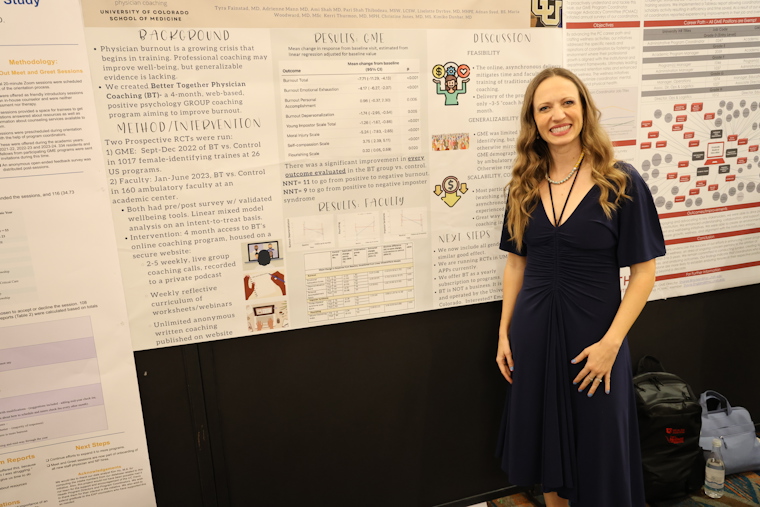Physician burnout is highly prevalent in the US, and disproportionately affects residents, fellows, and females. An initial study of an online group-coaching program in one graduate medical education (GME) program showed a reduction in burnout. This second study expanded the pilot to evaluate the generalizability of the program across 26 GME programs nationwide. Dr. Tyra Mason presented her team’s work in the Poster Hall at the 2024 ACGME Annual Educational Conference, held March 7-9, in Orlando, Florida.
Poster Title: Online Well-Being Group Coaching Program for Physicians: Two Randomized Control Trials
Primary Author: Tyra Fainstad, MD
Co-Authors: Ami Shah, MD; Pari Shah Thibodeau, MSW, LCSW; Liselotte Dyrbye, MD, MHPE; Adnan Syed, BS; Maria Woodward, MD, MSc; Kerri Thurmon, MD, MPH; Christine Jones, MD, MS; Kimiko Dunbar, MD; Adrienne Mann, MD
ACGME: Tell us about your academic and professional role.
Dr. Fainstad: I am an associate professor of medicine at the University of Colorado where I practice clinically as a primary care doctor. I am also the resident director for internal medicine learners at Lowry Internal Medicine. I have a scholarship interest in learner-centered feedback, assessment bias, and psychologically safe educational environments. I am also a certified professional life coach and co-director of an online group coaching program called Better Together Physician Coaching. I’m a recovering approval addict on a never-ending path to self-awareness. My purpose now is to create space for authenticity and positive change through helping doctors and learners access inner validation rather than relying on external praise.
ACGME: Can you briefly describe your research project for us?
Dr. Fainstad: This abstract describes our two most recent randomized clinical trials of the coaching program, Better Together Physician Coaching. The first trial occurred with more than a thousand women physician learners across 26 GME programs in the US. We randomized learners into either an intervention group, which was offered our online program in the fall of 2022, or to a control group, which was not offered the program until the spring of 2023, after the study had ended. We measured metrics of well-being in both groups. After the coaching program, the intervention group had improved in every single outcome we measured! This is the largest and most effective study of a well-being intervention we are aware of, and we are so thrilled to disseminate these results.
We then moved onto study the program in faculty physicians at an academic center, piloting Better Together among 160 ambulatory or primary care based faculty members in a study design that mirrored the one above. Similar to our pilot in residents, here we found improvements in some outcomes (burnout, impostor syndrome, and flourishing), but not in others (moral injury or self-compassion). We may not have been powered to find a difference there, and the next step is to scale the study in faculty members as well.
ACGME: What inspired you to do this project?
Dr. Fainstad: Our own personal early-career journeys of physician burnout. Dr. Adrienne Mann and I both suffered enormously from burnout, likely fueled by perfectionism, a lack of boundaries, and seeking external validation, that left us confused as to how to make safe decisions. We had never learned foundational lessons, such as how to name and process an emotion instead of immediately seeking to “fix” or “react to” it. After we each found coaching to be incredibly valuable, we decided to see if we could teach these skills to learners and clinicians to avoid the pitfalls we fell into.
ACGME: What did you discover?
Dr. Fainstad: This model appears to be a sustainable way to offer impactful well-being improvements to physicians and learners. We discovered a Number Needed to Treat of just 11 to take a physician from scoring positively for burnout to not scoring positively for burnout, and a Number Needed to Treat of just nine to cure impostor syndrome.
ACGME: What was the main takeaway?
Dr. Fainstad: In addition to the tools and program being useful, our most exciting finding was the scalability and feasibility of the program. The online platform and group nature of our coaching allows us to offer this impactful content to thousands of participants for very little faculty-coach time.
ACGME: Who could benefit from this research?
Dr. Fainstad: All medical students, residents, fellows, physicians, and advanced practice practitioners! And anyone who is seeking to support them and avoid the health care worker shortage crisis we face.

